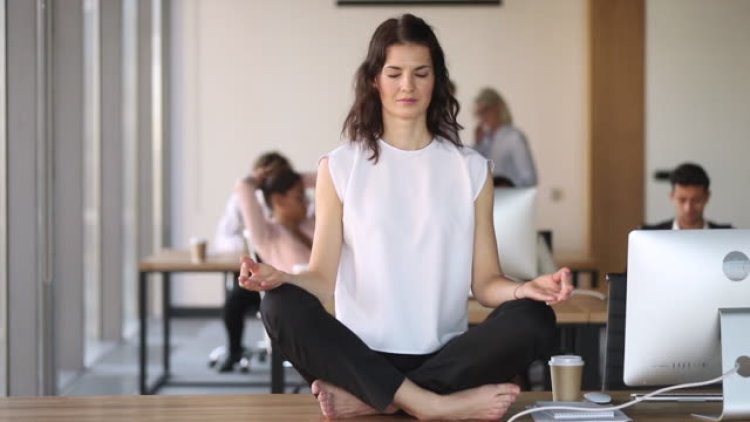How Meditation Improves Self-Confidence and Self-Esteem
Meditation can help boost your self-esteem and confidence. Let's find How Meditation Improves Self-Confidence and Self-Esteem?

How Meditation Improves Self-Confidence and Self-Esteem? Your self-respect and self-confidence significantly impact the decisions you make and the way you perceive the world. If you lack self-esteem, you are more likely to struggle with job performance, have difficulties in your relationships, struggle with addiction, and not pursue your objectives. Thankfully, meditation can help boost your self-esteem and confidence. Let's find How Meditation Improves Self-Confidence and Self-Esteem?
What are Self-Confidence and Self-Esteem?
We will begin by discussing the distinction between these two essential characteristics.
Self-confidence is the capacity to have faith in oneself. When you have high self-confidence, you are typically certain that the decisions you make are correct. You recognize that you are capable of accomplishing your goals.
People with high self-confidence tend to view their inevitable errors and failures as opportunities for growth. They do not over-identify with their defeats or dwell on them excessively. People with low self-confidence, on the other hand, may pass up superb opportunities because they do not believe they are capable of achieving them.
Your sense of self-worth is measured by your self-esteem. People with high self-esteem recognize that they are intrinsically valuable and that nothing they do can increase or decrease this value. People with a healthy sense of self-worth are receptive to criticism and errors because they recognize that both help them develop. Negative feedback or failure may sideline individuals with low self-esteem, and they may even incorporate it into their identities.
How Meditation Improves Self-Confidence and Self-Esteem
Meditation helps you improve your self-worth and mental health in several ways. Here are a few:
- Meditation helps you notice your thoughts so you can create distance from them. This is important because you can’t change a thought pattern until you know it’s happening. When you become aware of your negative self-talk, you’re able to consciously release it. In this way, you learn to stop overthinking and identifying with self-defeating thoughts. Instead, a meditation practice teaches you to simply watch them pass by, like watching clouds float by in the sky.
- Meditation helps you stay present and live in the moment. This is critical for self-esteem. When you’re truly focused on the present moment, it’s impossible to have self-defeating thoughts. Instead, you direct all of your awareness toward what you’re doing—like cooking a meal or talking with a friend.
- Meditation reduces the amount of time you spend thinking about yourself. This is a fantastic thing. Low self-esteem is often a result of being preoccupied with (negative) thoughts about yourself. But regular meditators enjoy reduced activity in the “me-center” of their brains.
A regular meditation practice is a vital part of a strong wellness routine. When you’re caring for your physical and mental health with a strong wellness routine, you tend to feel more self-assured. And a regular meditation practice is an essential part of any solid wellness routine.
Types of Meditation for Self-Confidence and Self-Esteem
Any meditation that centers you in the present moment and helps you let go of unhelpful thoughts is a great tool for building confidence and self-esteem. Here are a couple of methods we recommend:
Mindfulness Meditation
A mindfulness meditation brings all of your attention to the present moment. You can practice mindfulness meditation right now. Start by taking a couple of deep breaths. Then return to a regular breathing pattern and draw attention to your breath. Follow each inhale and each exhale. As distracting or judgemental thoughts arise, acknowledge them and then let them go. Learning to be present in the moment builds inner strength, which helps you release negative self-talk both in and out of meditation.
Loving-Kindness Meditation
Loving-kindness meditation is about fostering a sense of self-love. To do a loving-kindness meditation session, begin by bringing awareness to your breath. Then, start to create positive thoughts and feelings of compassion and love. Send those thoughts and feelings toward yourself. It can help to envision yourself as a child hearing all of the loving words. Once you’ve filled up your own love meter, you can send loving thoughts toward others. Loving-kindness meditation helps you replace negative self-talk with positive self-talk.
Visualization Meditations
Self-esteem can be enhanced through guided visualizations. By visualizing your own success, meditation programs such as Primed Mind help you develop self-confidence. Visualization helps you recall instances in which you were self-assured, and it encourages you to recall those images whenever you need a boost to your self-esteem.
Gratitude Meditation
During a gratitude meditation, you reflect on the aspects of your life for which you are grateful, such as your relationships, career, and health. Not only does this make you a happier and more appreciative person, but research indicates that practicing gratitude also increases one's self-esteem.
Additional Ways to Boost Self-Confidence and Self-Esteem
Meditation for self-confidence is most effective when used in conjunction with other esteem-boosting habits, such as:
- Getting seven to nine hours of sleep each night
- Eating balanced meals
- Getting regular exercise
- Surrounding yourself with positive people who uplift you
- Wearing clothing that makes you feel confident
- Regularly participating in activities you enjoy, like sports or hobbies
- Keeping the promises you make to yourself
- Maintaining a gratitude journal
- Doing good for others by volunteering or practicing random acts of kindness
- Having good posture
Frequently Asked Questions About Meditation for Self-Confidence
If you’re new to self-confidence meditation, you may have some questions. Here are a few we hear often:
What Are the Signs of Low Confidence?
A lack of confidence manifests itself in countless ways. You don’t need to display a specific “symptom” to meditate to build self-confidence. But it’s helpful to know what low self-esteem can look like. It could be:
-
- Feeling hostile or irritable
- Being very sensitive to criticism
- Withdrawing from your social circle
- Obsessing over personal problems
- Feeling like you don’t deserve the good things in your life
- Hearing a harsh or judgemental inner voice
- Having persistent negative thoughts
- Struggling to speak up for yourself
- Self-sabotaging your success when things start to go well
If you identify with one or more of these traits, it doesn’t mean you’re doomed. It simply means you may benefit from meditation for self-confidence!
Why Do I Lack Self-Confidence?
Many of us can trace our lack of self-confidence back to our infancy. If you experienced any situation as a youth that caused you to doubt your value, it can lead to low self-confidence as an adult. This may have been something significant, such as parental maltreatment or severe school torment. Or it could have been something you don't recall, such as an offhand critique from a respected authority figure. Or perhaps being rejected from a team or group is deeply ingrained in your subconscious.
The reality is that everyone encountered formative events that undermined their confidence. However, it is now our responsibility as adults to repair our self-image. Fortunately, meditation works miracles here.
How Do I Teach Myself Confidence?
Like all positive qualities, self-assurance begins with acceptance. Accepting your faults and errors alongside your positive qualities and achievements will increase your sense of self-worth over time. Meditation is a fantastic method for cultivating self-acceptance.
Self-challenge is another excellent method to eliminate self-doubt. When you do something outside of your comfort zone, you demonstrate your capacity for learning, growth, and taking on new challenges.
This has a significant impact on your confidence over time.
Can Mindfulness Increase Confidence?
Absolutely! Mindfulness requires you to be aware of the thoughts that run through your mind. When you practice mindfulness, you can catch any self-defeating thought patterns and work on releasing them.
At the same time, mindfulness also means that you’re dedicating all of your focus to the present moment. When all of your attention is on what you’re doing (like making a cup of coffee or writing an email), you don’t have the capacity to think negative thoughts about yourself.
How Can I Meditate on Self-Love?
A loving-kindness meditation is excellent for meditating on self-love. Start by mentally sending yourself compassion. We’re usually our own harshest critics, and self-love demands that we forgive ourselves for our flaws and mistakes.
Also read: Self-Esteem Meditation, How to Improve Self-Esteem
Using Primed Mind to Build Self-Worth and Self-Love
Self-confidence and self-esteem are critical for those who want to take big risks and get big rewards. But many high-achieving people struggle with these essential traits. Luckily, meditation is an effective, natural solution to help boost your self-worth and general well-being.
By requiring you to slow down and observe your thoughts, meditation helps you bring awareness to the damaging stories you tell yourself about your own worth. Once you’re aware of your harmful self-beliefs, you have the power to change them. Then, it’s only a matter of time until you see your self-confidence and self-esteem improve.












